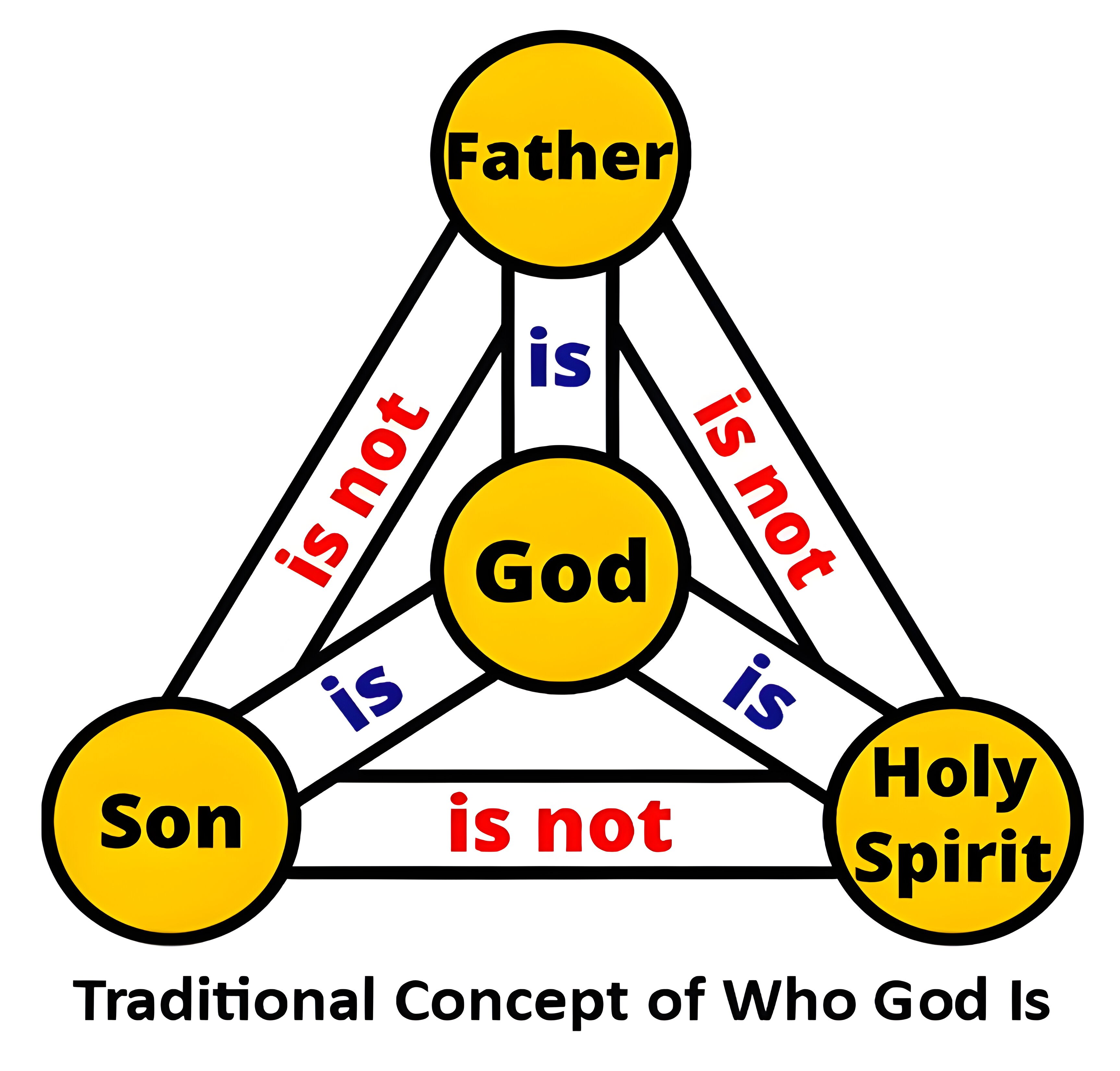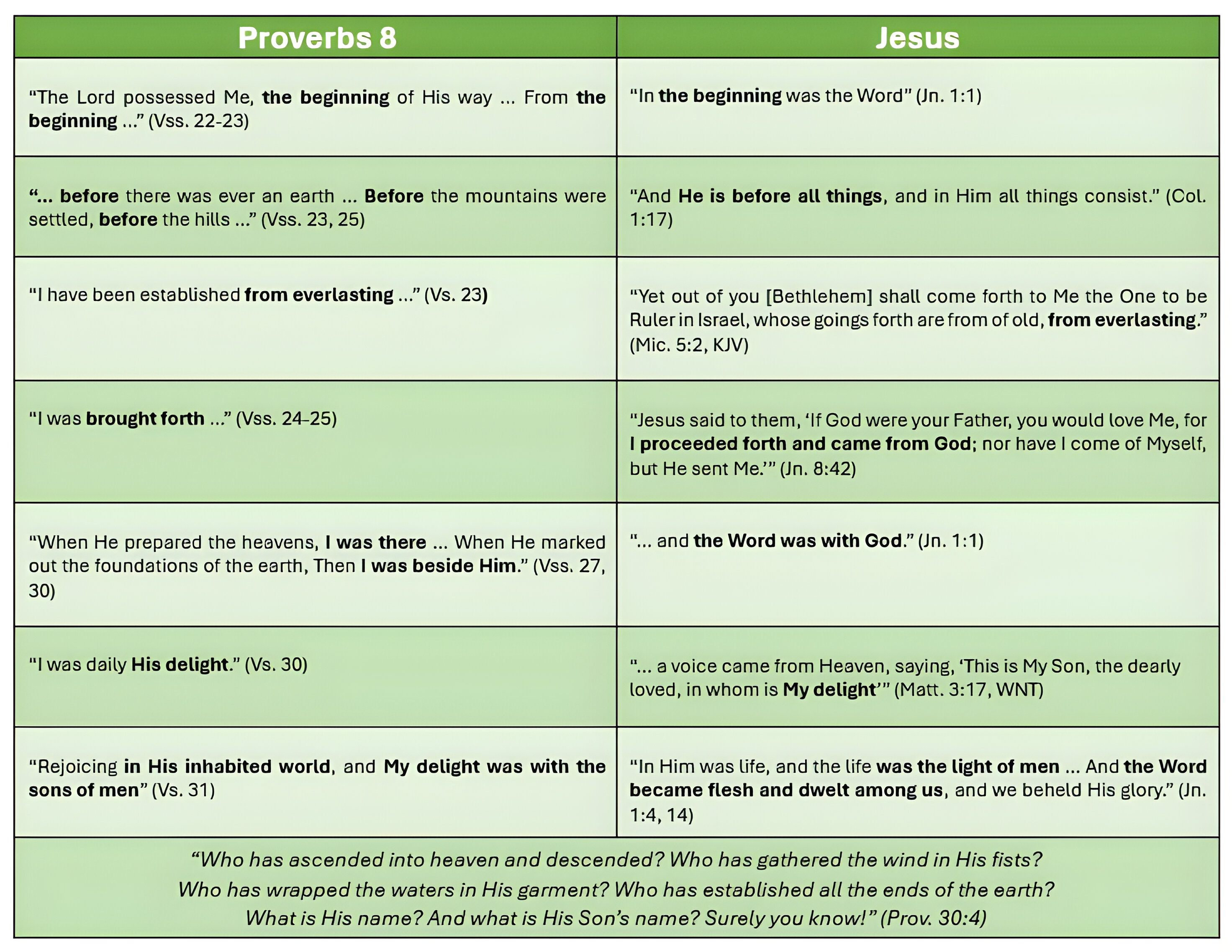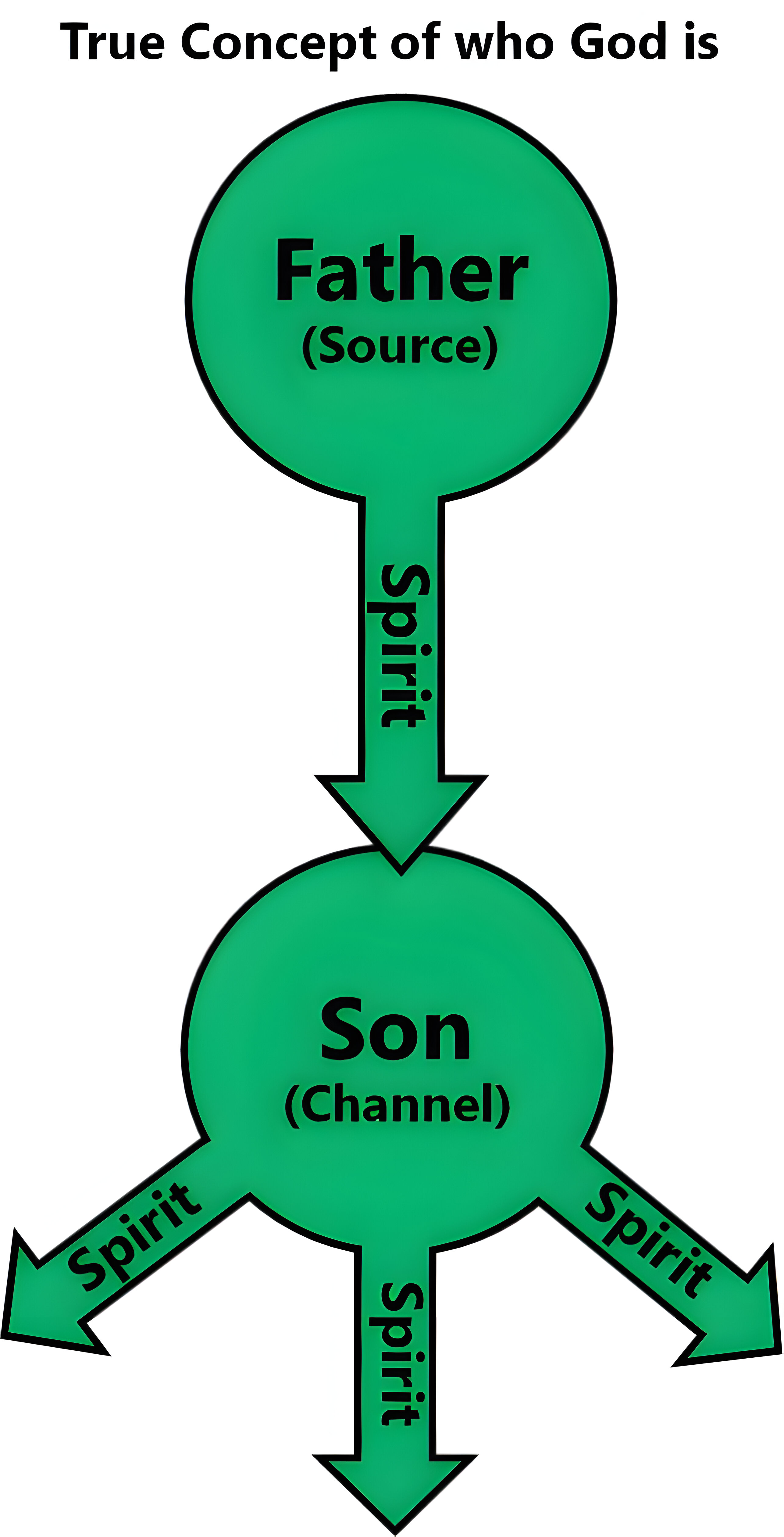Does Love Equal a Trinity?
Posted Jan 16, 2025 by Kevin J. Mullins in Questions Concerning the Trinity
 “He who does not love does not know God, for God is love." (1 John 4:8)
“He who does not love does not know God, for God is love." (1 John 4:8)
It is very interesting to learn that many Bible teachers claim that, since God is love, He must be a Trinity. I have even heard it taught from the pulpit that one of the reasons to believe this assumption is because the phrase “God is love” is composed of three words. Although I do not believe this latter reason holds any merit whatsoever (therefore no rebuttal needed), the claim that “in order for God to be love, He must be a Trinity”, does have an attractive reasoning to the point that many call it a “slam dunk argument.” For example, in an article on thegospelcoalition.org, entitled: No Trinity, No Love, dated May 7, 2016, Jared C. Wilson claims:
“Think about it: A solitary god cannot be love. He may learn to love. He may yearn for love. But he cannot in himself be love, since love requires an object. Real love requires relationship. In the doctrine of the Trinity we finally see how love is part of the fabric of creation; it’s essential to the eternal, need-nothing Creator. From eternity past, the Father and the Son and the Spirit have been in community, in relationship. They have loved each other. That loving relationship is bound up in the very nature of God himself. If God were not a Trinity but merely a solitary divinity, he could neither be love nor be God.”
This is actually an old argument that Augustine hinted at, which was later articulated by Richard of Saint Victor— a Roman Catholic theologian chiefly remembered for his works on mysticism. He wrote:

“One never says that someone properly possesses love if he only loves himself; for it to be true love, it must go out towards another. Consequently, where a plurality of persons is lacking, it is impossible for there to be love.” (De Trinitate [On the Trinity], III.2)
However, keep in mind that in 1 John 4:8, it does not say “God is loving” (even though He is). John is not discussing God’s behavior here, but instead His nature. God’s nature is love, and since His nature is love, His behavior is loving. Contrary to the claim that “a solitary god cannot be love”, Scripture insists that God’s nature of being love is not dependent on His behavior, but His behavior is most definitively dependent upon His nature.
The Greek word John uses for "love" here is ἀγάπη (agapé). Although this love is rightly defined as an others-centered love, it is not a love that “finds” value in others but a love which bestows or invests value upon others. With this correct understanding, it is not reasonable to conclude that there must be co-equal and co-eternal “others” to love. Scripture also says God is ever merciful, but this does not mean that sin is co-eternal with God in order for Him to be merciful (i.e., full of mercy). Do you believe a doctor is no longer a doctor if he/she has no patients? A doctor is a doctor whether at work or not, or whether people come to him/her or not, or whether people listen to and follow his/her advice or not. God is love, and everything He does is an expression of who He is; whether we come to Him, listen to Him or follow His commands or not.
When most Christians think of God, they say or think The Trinity— God the Father, God the Son, and God the Holy Spirit— a unity of three co-eternal (the same age), co-equal (self-existent) persons (beings). If it is true that “love requires an object” and that the Trinity has eternally “loved each other”, then wouldn’t that describe self-love since all three make up the one God? If God needs an object equal to Himself for His full powers of love to be expressed, then this type of love is seeking value and fulfilling a need. These are not descriptions of agapé but another form of love— eros.
Jesus, the Begotten Son
Another idea closely related to our subject of “love equals a Trinity” is that, since all three members of the Trinity are co-equal and co-eternal, then the Sonship of Christ is to be understood as metaphorical or figurative. For example, referring to Psalm 2:7, where God says to Jesus, “You are My Son, today I have begotten You”, Baptist pastor John MacArthur explains:
“It is reasonable to conclude that the begetting spoken of there is also something that pertains to eternity rather than a point in time. The temporal language should therefore be understood as figurative, not literal” (John MacArthur, gracetoyou.org, Reexamining the Eternal Sonship of Christ)
Echoing this thought, Adventist teacher, Eric Livingston says:
“The name ‘Son of God’ is a metaphor, a figure of speech.” (Eric Livingston, ericlivingston.com, The ‘Son of God’: Literal or Metaphor?)
The conclusion is that the three members of the Trinity decided amongst themselves who would play the role of the Father, the role of the Son, and the role of the Holy Spirit. This teaching then leads to the pagan belief of multiple gods, or in this case, three Gods. Don’t believe me? One commentator explains it like this:
“I believe the three Gods cast lots to see which role each God would take on. As distinct, separate, coeternal deities, any one of the three Gods could perfectly fill any of the three roles. Assuming lots were cast, they chose one God to serve as ‘Ruler of the Universe’ [1 Timothy 6:15] who would sit on the throne and be called ‘Holy Father’ … Another God was chosen to serve as the Holy Spirit ... Finally, the remaining God was appointed to serve as ‘Creator and Speaker of the House.’ Today, we call this God, ‘Jesus' ... At the end of the meeting, the three Gods were satisfied with their agreements, plans, limitations, and roles. A new organization was established called The Godhead or Trinity.” (Larry W. Wilson, Untold Story of Jesus – Three Roles of the Godhead Decided, Ch. 3)
The above comment is very confusing. Is the Trinity one God or “three Gods”? In addition, the statement that, after these "three Gods" agreed to their roles, "A new organization was established called The Godhead or Trinity" suggests that the Trinity did not exists prior to this agreement. Would this not go against the traditional understanding of the Trinity doctrine? And finally, Mr. Wilson also suggests that the word "Godhead" is synonymous with "Trinity" which it is not. The word found in the Greek is θεότης (theotés), which literally means “deity”, “divinity”, “divine nature.” It does not mean “Trinity” nor was it ever used by the New Testament writers to refer to a Trinity.
Speaking of the Father and Son, Gordon Jenson writes:
“In order to eradicate sin and rebellion from the universe and to restore harmony and peace, one of the divine Beings accepted, and entered into, the role of the Father, another the role of the Son.” (Gordon Jenson, Adventist Review, October 31, 1996, p.12. Week of Prayer readings, article Jesus the Heavenly Intercessor)
So, to these teachers, it is all role-playing because if it were literal, then God would be a literal Father and Jesus would be a literal Son, therefore (in their understanding) Jesus would not be divine, but a created being. However, the Bible tells us that Jesus is divine because He is the literal Son of God.
In his gospel account, John writes: “For as the Father hath life in Himself; so hath He given to the Son to have life in Himself” (John 5:26). Since God gave His Son to have life in Himself, then is this not an expression of agapé? God the Father invests value in His Son and makes Him equal. This is exactly what 1 John 4:8 indicates. It is precisely in giving/investing everything to His Son that God shows He is agapé. Since Jesus was given everything by His Father, when we behold the Son of God, we are beholding One who has had everything invested in Him. We no longer behold a picture of one who finds acceptance by being equal, but rather, we behold One that was made equal. This is what the word “beloved” means. The Greek word for “beloved” is ἀγαπητός (agápetos), which reveals Jesus is the One upon whom the Father has given all things— “The Father loves [agapaó] the Son, and has given all things into His hand” (John 3:35). That is others-centered love, not the eros love that needs a being equal with it to actually love.
Nevertheless, do not misinterpret the word “made” here to mean, “created.” The book of Hebrews teaches that Jesus inherited all that the Father has and is fully divine through that inheritance: “He [Jesus] hath by inheritance obtained a more excellent name” than any of the created angels (Hebrews 1:4). This inheritance is not a metaphor, but literal. Scripture does not say that Jesus is God’s “only” Son, it says He is the “only begotten” Son. Scripture describes many “sons of God” such as the angels (Job 38:6-7), Adam (Luke 3:38), and of course all believers (Romans 8:4).
 Jesus however is not a Son by creation, as were the angels and humanity, but He is a Son begotten in the express image of the Father’s person (Hebrews 1:3), who “came forth and proceeded from God” (John 8:42) “in the days of eternity” (Micah 5:2). The Greek word translated “from” in John 8:42 is the word ἐκ (ek), which literally means, “from out, out from among, from, suggesting from the interior outwards.” Jesus literally came out from within the Father (God), not merely out from His presence (i.e., heaven). He is represented in Scripture as “the stone” which was “cut out of the mountain [Father] without human hands [uncreated]” (Daniel 2:45). The “stone” (Son) and the “Mountain” (the Father) are of the same substance (divine).
Jesus however is not a Son by creation, as were the angels and humanity, but He is a Son begotten in the express image of the Father’s person (Hebrews 1:3), who “came forth and proceeded from God” (John 8:42) “in the days of eternity” (Micah 5:2). The Greek word translated “from” in John 8:42 is the word ἐκ (ek), which literally means, “from out, out from among, from, suggesting from the interior outwards.” Jesus literally came out from within the Father (God), not merely out from His presence (i.e., heaven). He is represented in Scripture as “the stone” which was “cut out of the mountain [Father] without human hands [uncreated]” (Daniel 2:45). The “stone” (Son) and the “Mountain” (the Father) are of the same substance (divine).
When Jesus called Himself the “only Begotten” Son of God in John 3:16, John uses the compound word μονογενής (monogenés). The word mono means “only” and genés literally means “genetic.” Jesus is God’s “only genetic” Son. Some like to replace monogenés with the word “unique”, but it’s only the first half of the word (mono) which could be interpreted as “unique”. Thus, the truth remains that Jesus is “unique” because He is God’s only genetic Son.
“Monogenés – Definition 2: As the only-begotten Son he shares all things with the Father. His glory is not merely like that of an only child; it is that of the only-begotten Son (Jn. 1:14). He is not just unique; he is the Son, for combined with huios [Son] the term describes his origin. The risen Lord is also the preexisting Lord, who is with God, is loved by him, and shares his glory from all eternity (17:5, 24). Whether or not this implies actual begetting by God is debated by some, but 1 Jn. 5:18 definitely teaches this, for sonship is here presented in the terms of begetting.” (Gerhard Kittel, Theological Dictionary of the New Testament)
In the inheritance given to Christ, we are able to hear the loving words of a real Father who spoke to His real Son: “This is My Son, the dearly loved, in whom is My delight” (Matthew 3:17, Weymouth New Testament). The words “Father and Son” only find meaning through inheritance, which agapé allows. This is also why John, referring to Jesus, wrote:
“In the beginning was the Word, and the Word was with God, and the Word was God.” (John 1:1)
John spoke of Jesus (the Word) as being “in the beginning”, “with God” and “was God.” This “Word” (Jesus) “became flesh and dwelt among us, and we beheld His glory, the glory as of the only begotten of the Father, full of grace and truth” (Verse 14). In the first mention of “God” (“the Word was with God”), the Greek text has a definite article (“the”)— “the Word was with the God.” This points us to a particular object or person, in this case the Father. However, in the second use of the word “God” (“and the Word was God”) there is no definite article. This phrase is not pointing to an individual but to a characteristic, in this case divinity— “And the Word was divine.” Therefore, what this verse literally means is that Jesus (the Word) is the divine Son of the God (i.e., the Father) who existed “in the beginning” with the God. Since God is love, He manifested that love by bringing forth a Son.
 “The Lord possessed me in the beginning of His way, before His works of old. I have been established from everlasting, from the beginning, before there was ever an earth. When there were no depths I was brought forth, when there were no fountains abounding with water. Before the mountains were settled, before the hills, I was brought forth; while as yet He had not made the earth or the fields, or the primal dust of the world. When He prepared the heavens, I was there, when He drew a circle on the face of the deep, when He established the clouds above, when He strengthened the fountains of the deep, when He assigned to the sea its limit, so that the waters would not transgress His command, when He marked out the foundations of the earth, then I was beside Him as a master craftsman; and I was daily His delight, rejoicing always before Him.” (Proverbs 8:22-30)
“The Lord possessed me in the beginning of His way, before His works of old. I have been established from everlasting, from the beginning, before there was ever an earth. When there were no depths I was brought forth, when there were no fountains abounding with water. Before the mountains were settled, before the hills, I was brought forth; while as yet He had not made the earth or the fields, or the primal dust of the world. When He prepared the heavens, I was there, when He drew a circle on the face of the deep, when He established the clouds above, when He strengthened the fountains of the deep, when He assigned to the sea its limit, so that the waters would not transgress His command, when He marked out the foundations of the earth, then I was beside Him as a master craftsman; and I was daily His delight, rejoicing always before Him.” (Proverbs 8:22-30)
You may object here saying that Proverbs 8 is speaking about “Wisdom” (see, verse 12). Yet, it is clear that it is poetically speaking about Jesus. In the Apocryphal book, Wisdom of Solomon, we read this:
“For she [Wisdom] is the brightness of the everlasting light, the unspotted mirror of the power of God, and the image of his goodness.” (Wisdom 7:26)
There is no doubt that this is where the author of Hebrews draws his conclusion from when he writes that the divine Son (Jesus) is “the brightness of His [God’s] glory and the express image of His [God’s] person” (Hebrews 1:3). Also notice that Wisdom 7:26 speaks of Wisdom as being “the unspotted mirror of the power of God.” Compare that to what Paul wrote when he referred to Jesus as both “the power of God and the wisdom of God” (1 Corinthians 1:24,30).
But if Proverbs chapter 8 and the book of Wisdom is speaking of Jesus, the Son, why do they refer to wisdom as female?— “Does not wisdom cry out, and understanding lift up her voice?” (Proverbs 8:1). This personification of Wisdom does not imply that Wisdom is a woman. In Hebrew and many other languages such as Spanish, Greek, German, Portuguese and Italian, nouns are assigned a gender regardless of the actual gender of the person or object they represent. In fact, the Hebrew word for “spirit” is רוּחַ (ruach), which in Hebrew is a feminine noun. So are we to believe that when Moses wrote, “And the Spirit of God moved upon the face of the waters” in Genesis 1:2, he is teaching us that God’s Spirit is female? Of course not.

In Genesis chapter 1, we learn that everything begets “according to their kind.”
“Then God said, ‘Let the earth bring forth grass, the herb that yields seed, and the fruit tree that yields fruit according to its kind, whose seed is in itself, on the earth’; and it was so. And the earth brought forth grass, the herb that yields seed according to its kind, and the tree that yields fruit, whose seed is in itself according to its kind. And God saw that it was good …” (Genesis 1:11)
“God created great sea creatures and every living thing that moves, with which the waters abounded, according to their kind, and every winged bird according to its kind. And God saw that it was good.” (Genesis 1:21)
“Then God said, ‘Let the earth bring forth the living creature according to its kind: cattle and creeping thing and beast of the earth, each according to its kind’; and it was so. And God made the beast of the earth according to its kind, cattle according to its kind, and everything that creeps on the earth according to its kind. And God saw that it was good.” (Genesis 1:24)
“A plain reading of the text infers that plants and animals were created to reproduce within the boundaries of their kind. Evidence to support this concept is clearly seen (or rather not seen) in our world today, as there are no reports of dats (dog + cat) or hows (horse + cow)! So a good rule of thumb is that if two things can breed together, then they are of the same created kind. It is a bit more complicated than this, but for the time being, this is a quick measure of a “kind.” As an example, dogs can easily breed with one another, whether wolves, dingoes, coyotes, or domestic dogs. When dogs breed together, you get dogs; so there is a dog kind. It works the same with chickens. There are several breeds of chickens, but chickens breed with each other and you still get chickens. So there is a chicken kind. The concept is fairly easy to understand.” (Bodie Hodge and Dr. Georgia Purdom, What Are “Kinds” in Genesis?, April 16, 2013, answersingenesis.org)
In Romans 1:20, Paul points out “For since the creation of the world His [God’s] invisible attributes, that is, His eternal power and divine nature, have been clearly perceived, being understood by what has been made, so that they are without excuse” (New American Standard Bible). This lesson that creation teaches us about “kinds” is revealing the divine relationship between the Father and the Son. Christ is God (divine) because He was begotten and came forth out of God. Again, He is not a created being (i.e., a different “kind” than God, like angels and humanity), but is a Son begotten (i.e., of the same “kind”— divine).
 Not only in the creation of plants and animals, but also the creation of mankind do we see “His eternal power and divine nature.” In Genesis 1:26-27, God said to His Son:
Not only in the creation of plants and animals, but also the creation of mankind do we see “His eternal power and divine nature.” In Genesis 1:26-27, God said to His Son:
“Let Us make man in Our image, after Our likeness … So God created man in His own image; in the image of God He created him; male and female He created them.”
Just as Jesus is of the same kind as God (divine) because He came out of God, we are all of the same kind (human) because we are begotten and come out of humans. It is the perfect divine pattern of life, thus Adam said this concerning Eve: “This is now bone of my bones and flesh of my flesh; she shall be called Woman, because she was taken out of Man” (Genesis 2:23).
Just as Christ is “the brightness of His [God’s] glory”, Scripture says, “woman is the glory of man” (1 Corinthians 11:7). Likewise, just as “the head of Christ is God”; “the man is head of the woman” (1 Corinthians 11:3). Obviously, this “headship” is not in an abusive tyrannical domination, but a channel of blessing. The Bible presents the Father as the Self-originating God, the source of all, and His Son who is God by inheritance and the one true divine example to all the universe of how to serve and give glory to the Father.
In Genesis 3:20 it says, “And Adam called his wife's name Eve, because she was the mother of all living.” Adam was the source of whom are all the living; Eve was the channel through whom all living things came into being, thus revealing to us the divine pattern of the Father “of whom are all things” and His Son “through whom are all things” (1 Corinthians 8:6).
The word “of” in the phrase “of whom are all things” is again the Greek word ek, which Strong’s Lexicon says, “is used to indicate origin or source, often translated as ‘from’ or ‘out of.’” The word “through” in the phrase, “through whom are all things” is the Greek word dia, which Strong’s Lexicon defines as:
“A primary preposition denoting the channel of an act … In the New Testament, it frequently appears in contexts that describe the means by which God accomplishes His purposes …”
-Son_(Channel).jpeg)
Referring to God’s Holy Spirit, Jesus said:
“If ye love Me, keep My commandments. And I will pray the Father, and He shall give you another Comforter, that he may abide with you for ever; Even the Spirit of truth; whom the world cannot receive, because it seeth Him not, neither knoweth Him: but ye know Him; for He dwelleth with you, and shall be in you. I will not leave you comfortless: I will come to you.” (John 14:15-18, King James Version)
Back in verse 6, Jesus declared, “I am the way, the truth, and the life: no man cometh unto the Father, but by Me.” Therefore, “the Spirit of truth” who “shall be in you” and comfort you is not another being, but the very Spirit (Presence) of Jesus Himself (Galatians 4:6). The Greek word for “Comforter” here is παράκλητος (paraklétos), which is the same word John uses in his first letter where he says, “if any man sin, we have an advocate [paraklétos] with the Father, Jesus Christ the righteous.” It could have been easily translated as, “if any man sin, we have a Comforter with [or, along-with] the Father, Jesus Christ the righteous.”
Strong’s Lexicon gives us other words to define paraklétos such as: “Advocate, Helper, Comforter, Counselor.” Jesus is an “Advocate”; “Helper”; Comforter”; and “Counselor” along-with the Father, thus Scripture tells us “the counsel of peace shall be between them both” (Zechariah 6:13). “Both”— not three!
Going back to Creation, right after God, through His Son, created Adam and Eve we read, “Then God saw everything that He had made, and indeed it was very good” (Genesis 1:31). After this accomplishment, “The heavens and the earth, and all the host of them, were finished. And on the seventh day God ended His work which He had done, and He rested on the seventh day from all His work which He had done. Then God blessed the seventh day and sanctified it, because in it He rested from all His work which God had created and made” (Genesis 2:1-3).
God “finished” His work, called everything “very good” and “rested” after Adam and Eve were created. Take note that this expression “very good” was NOT in anticipation of perfection that would come later, after a third being entered the scene (Cain), but for that time when there were “two.” This clearly shows that God’s agapé love is NOT dependent on a love triangle (three). To insinuate otherwise would suggests that the Father needs the Holy Spirit and Jesus (as two other separate co-equal, co-eternal beings) to be there to stop His natural tendency to narcissism developing. This again is a needs-based love— eros.
And what about couples who cannot have children? Is their love for one another not perfect enough and doomed to narcissism too? If perfect love is three, then God was wrong to create two and love could not exist until Cain came along. Would this also insinuate that the Father and Son had narcissistic adoration without a third being? The Bible simply says that the Father is love (agapé); therefore, it is His nature to love (agapé). (Please keep in mind that, even though “God is love”, we are not to confuse this with the idea that love is God). This agapé was first manifested (revealed) in the bringing forth of the begotten Son. This is why Jesus is the Son of the Father’s agapé who manifested (revealed) that agapé by being sent and given to us:
“He who does not love does not know God, for God is love [agapé]. In this the love [agapé] of God was manifested toward us, that God has sent His only begotten Son into the world, that we might live through Him.” (1 John 4:8-9)
Many who believe in Christ’s metaphorical Sonship claim that Jesus is the only begotten Son because He is the one in whom God’s love is finally and fully manifested within the human realm. However, Scripture says, “For God so loved the world that He gave His only begotten Son …” (John 3:16). God’s love for the world was not manifest because He sent His Son, but because He loved the world, He sent His Son into the world. This should also dispose of the theory that Christ was only begotten at His incarnation as a human babe in Bethlehem. Since God “sent” His only begotten Son “into the world”, then Jesus was God’s only begotten Son before He came into the world. God had to have a Son in order to send Him. As Micah 5:2 says, “But you, Bethlehem Ephrathah, who are small among the clans of Judah, out of you will come forth for Me One to be ruler over Israel—One whose origins are of old, from the days of eternity” (Berean Standard Bible). The Hebrew word for “origins” here is מוֹצָאָה (mowtsa'ah), which Strong’s Lexicon defines as, “origin, source, place of going out, a family descent.” Micah is referring to Christ’s uncreated origins, His coming forth from within God (family descent), in “the days of eternity” (i.e., before time began).
In conclusion, let’s read this verse, also from John:
 “Behold, what manner of love the Father hath bestowed upon us, that we should be called the sons of God: therefore the world knoweth us not, because it knew Him not.” (1 John 3:1)
“Behold, what manner of love the Father hath bestowed upon us, that we should be called the sons of God: therefore the world knoweth us not, because it knew Him not.” (1 John 3:1)
Here again, the word for love is agapé. Just as agapé was bestowed upon His only begotten divine Son, Jesus, this agapé has been “bestowed upon us, that we should be called the sons [or, children] of God.” As He prayed to His Father the night before His death, Jesus desired “that the world may know that You [Father] have sent Me, and have loved them as You have loved Me” (John 17:23). The word “loved” here is simply the verb form of agapé (agapaó). Therefore, Jesus is assuring us that God loves us as much as He loves Him. Then, after His resurrection, Jesus comforts us saying, "I am ascending to My Father and your Father, to My God and your God" (John 20:17).
We humans have the same God and same Father that Jesus does! However, if Jesus’ Sonship is merely a metaphor, then God’s Fatherly love for His only begotten Son is merely a metaphor. Moreover, if God’s love for His only begotten Son is merely a metaphor, then God’s Fatherly love for us is merely a metaphor. Therefore, when Scripture says, “God is love”, it must be just a metaphor. Thus, if this metaphorical love is dependent upon a Trinity, then the Trinity self-destructs into a mere metaphor.